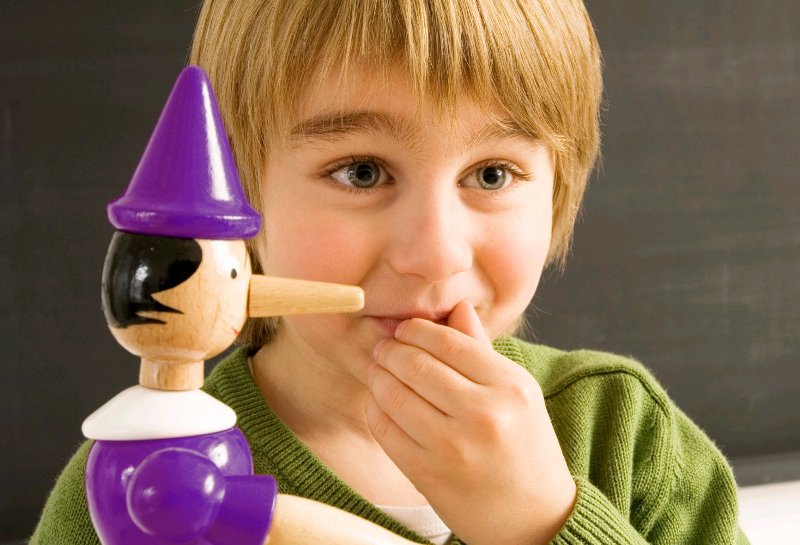
The child's lie is the character of character, the gaps of education or the reaction to adult behavior? How to deal with the reasons if the child is lying? What needs to be done to cope with this situation? About this in our article.
The content of the article
Parents can perceive the lies of the child in different ways and react to it. Some believe that children's deception is cute and naive trifle, others are inclined to beat the alarm if the child is lying from an early age who will grow out of him.
Lie or fantasy?
It is not necessary to completely dramatize the situation - for a start, it is necessary to observe the behavior of the child and objectively assess cases of deception. It is important to learn to distinguish a conscious lie from the flight of imagination and children's fantasies.
- In the younger age (2-3 years old), the imagination of the child is actively developing - many children love to fantasize and teach. Perhaps this will later affect the warehouse of thinking, and your creative person will grow in your family. Characters of fairy tales, good fictional heroes at an early age become essential satellites of the child with whom he prefers to play or identify himself. Suppression of child fantasy is a mistake of parents, because in a game form, the child will know the world around the world and his laws, learns to distinguish reality from fiction.
- Another thing, if a child is lying in situations relating to everyday life. Such situations can lead to problems in the family and children's team.

Imagination and fantasy child - Method of self-expression
Why is a child in adults?
If you notice the baby is lying, it is necessary to deal with the reasons for such behavior. Children are not born bad - most likely your baby reacts like this to the existing life situation.
- Cheating for personal gain. In this case, a lie becomes a way to achieve a mercenary goal. There are no circumstances for the child - he makes a conscious choice towards the deception of adults. Perhaps the gaps of education are affected - the child does not consider to lie to the gallop, if it leads to the achievement of the target.
- Lie for protection. Sometimes a child is lying to protect the comrade. In such cases, parents should carefully consider the situation and discuss with the child that deceiving is bad, but in exceptional cases, if a lie is a means of protecting the weak, it can be permissible.
- Excessive rigor. The reason for lias can be simple - the child is very afraid of punishment, trying to avoid him all ways, so tells a lie. Typically, this happens in families where parents apply a strict sentence system. It may be not only physical punishment - many children are also afraid of a cry or deprivation of any benefits. Therefore, in the case of the provinity, they try to twisted in any way - and suddenly swears! If not, the punishment still can not be avoided.
- Restriction in the expression of emotions. Parents want to see their child calm and cheerful, meeting every day with joy and positive mood. But adults should understand that the child is an independent person who has the right to manifest his mood. If the baby is forbidden to express feelings and experiences, he can block in himself and lie, depicting cheerfulness.
- Parents are satisfied with the play using the child's feelings. In such cases, parents use incomprehensible children's mind things - in the case of their provinces, they grabs or head, trying to show that they can get sick or die from bad behavior or child assessments. Such adult behavior can scare the baby and bring a teenager from equilibrium 10-12 years. Next time, the child will just try to hide the problem than to experience a similar surge of emotions.
- Lack of praise by adults. If a child never hears the words of approval for his actions from parents or teachers, a lie becomes the only way to look better in the circle of your communication. In adolescence, children are trying to compensate for a complex of inferiority, to become an object of admiration, albeit false. Intends on their success talking about the fact that the child does not suit his social status, he does not see support from parents, has no real friends. Parents need to pay special attention to the psychological state of the Son or daughter. Perhaps you give a child too little time or it is an outcast among peers.
- Protest against restrictions. Not always parents can understand that the child's maturity implies the weakening of permanent guardianship. Many children annoy and stimulate constant control, defending the right to personal opinion, time and their own space. Such teenagers can deceive parents just to go against the power of adults. In this case, parents need to be distinguished by the concepts of independence and permissiveness. If a teenager sees understanding and confidence from parents - he himself will show the desire to be honest and open.
- Family crisis. If you notice that your child is lying, becomes unmanageable, showing attacks of aggression, sometimes theft, - so the hidden cry of despair is manifested. Perhaps the relationship between spouses was smashed, and the case goes to the divorce or the single parents had a new satellite of life. Then the child is trying to attract the attention of adults by all means. This situation is one of the hardest, because the parents themselves are not always able to solve the problem and find a way out that would not have injured the child.
Calmly and weigly analyze how you raise a child, how much time you pay him, what values \u200b\u200bare vaccinating, on which examples do it. Think about the situation in the family - the relationship between spouses, the influence on the upbringing of the baby of other family members. It is important to figure out how the child's relationship is in the children's team - when contacting peers and teachers.
Evaluating all these aspects, you may define a problem for yourself and try to find ways to solve it.

The causes of the lies of the child can be different
How to behave if the child is lying?
How to do if you notice a lies of the child?
If you are offended or outraged by deception, do not hurry with the censure and punishment. First of all, calm down and talk to the baby.
- Sit next to the child so that the visual contact is formed.
- Quietly, let you know that he lied to you.
- Ask to tell you the truth, while having a child that you will not punish it, and the truth is always better than deception.
- Tell me that you love him very much and in any case support it.
- When the baby tells you the truth, try to figure out the situation and understand why he deceived you.
- Do not go to the emotional tone, do not blame the child so as not to lose his trust.
- Discuss with the cloth, as it was necessary to enter the situation, bring examples from your childhood.
- Finish the conversation with the assurance that you are always ready to help and love very much.
Of course, one such conversation may not be enough. Try to communicate with the child always, and not only when there are difficulties.
- Take the rule to discuss how the day of the baby was held, which was good and bad that he was pleased and disappeared that he learned new and interesting.
- Tell how you spent your day - what they were doing at work, they paid attention to the street.
- So confidence relationships between the adult and the child are formed - if the baby sees the sincere response to his experiences, he will share them with you first.

Learn to listen and understand the baby
How to do if a teenager is deceived?
- In the transitional age, the reason for lies is in manifestation of independence, the desire to create a personal space where adult access will be limited.
- The task of parents is to provide a child with such a space for self-expression, give it to feel that you support his growing up, you understand its needs.
- At the same time, it is necessary to clearly limit the framework of independence and discuss it with the child. Be prepared for compromises and disputes, but the arrangement must be achieved.
- If the teenager is confident that his parents love and support him, he will not want to lose adult confidence.

Teens sharply react to the situation in the family and the restriction of personal space
Your child will be honest if:
- He gets enough attention and approval by his actions.
- He is not afraid of reproaches and penalties.
- He knows that he can trust parents in any situation.
- He is sure that he will understand him and support, no matter what happens.
- He is sure of the uncondition of your love.
Important: Trust relationships with the child should be built from early childhood.

Learn to build trust relationships with a child
The atmosphere in the family also affects the formation of the psyche of the baby. Be honest with him and in a relationship with other family members, do not disdain from the difficulties and experiences of loved ones - try to listen to them and understand. Then you will see that the child is open and honest, considering you the best friend and undoubted authority.
If you see that unable to solve the problem with a deception of a child yourself, contact your child psychologist. An experienced specialist will help to understand the situation and hidden reasons for such behavior.
